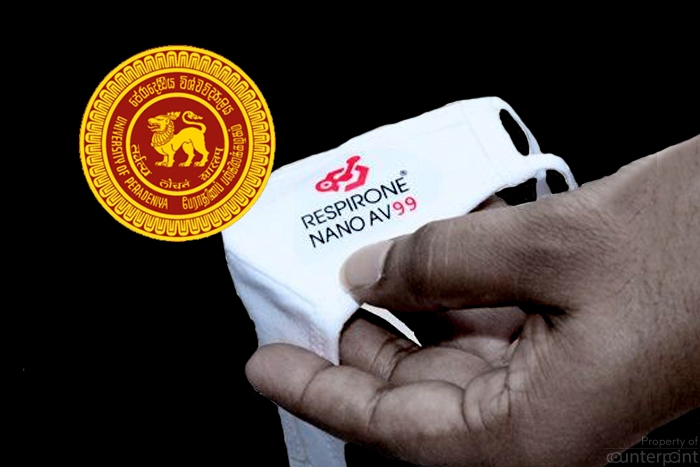Researchers from the University of Peradeniya who invented the Respirone Nano AV99 face mask will present their product to the diplomatic community today for it to be marketed in their countries. The production of the mask for the local market has already begun and will be available as soon as possible.
The mask is unique because it is three -ply and the layers have properties that will repel and kill the SARS CoV- 2 virus.
The Respirone has advantages over most other masks.
The mask’s filtration level of aerosol particles containing the virus is nearly 100 percent.
The Respirone is made of cotton and is bio-degradable which makes it environmentally friendly. Most other masks are made of polypropelene which is damaging to the environment.
‘This type of three -ply mask is currently not available anywhere in the world’, points out Professor Gamini Rajapakse who heads the team of researchers that invented and designed the Respirone. ‘We have been working hard ever since the Covid-19 pandemic started in Sri Lanka because we wanted to use our knowledge to contribute to its control’.
The mask’s upper layer is made of cotton which is modified nano-technologically to make it water repellent.
Professor Rajapakse who is the senior professor in Chemistry and Nanotechnology in the University draws a parallel with the superhydrophobic nature of the lotus leaf off which water rebounds.
‘If any aerosol particle containing the virus reaches the upper layer of the mask the particle is repelled’. It also keeps the mask dry and clean.
The middle layer of the mask is also made of cotton. The pores are blocked using microparticles which are the same size as the fabric’s pores to ensure no particles such as the SARS CoV-2 penetrates. But it allows molecules in the air to flow in for breathability.
‘The particles which have been used have a positively charged surface so that they attract the negatively charged SARS CoV-2 viral envelope and bind electrostatically on their surface’.
The surface of the middle layer also contains star-shaped nanoparticles with sharp nano blades which are capable of cutting the virus’s spike proteins.
‘It’s the same as cutting them using scissors’, explains Professor Rajapaksa. ‘This is a unique characteristic because microbes cannot develop any resistance to physical destruction. The nanoparticles are capable of destroying not only the present variants of SARS CoV-2 but any future mutations and hybrid versions as well since they all have these spike proteins which can be cut to pieces by the nano blades’.
Although the mask has four inbuilt mechanisms by which these nanoparticles can destroy the virus, this physical action is the dominant one.
The Respirone’s virus killing efficiency was measured at the Peradeniya University’s Virology Unit using a SRV coronavirus which is similar to Covid-19. It was found that at half the concentration used, the nanoparticles killed the viruses completely giving zero RSV Antigen Cell Viability.
According to Professor Rajapakse the materials were also tested for various bacteria and it was found that it kills all bacteria types which the research team had studied. ‘We are confident that this middle layer does not allow any viral or bacterial particle to pass through’.
Professor Rajapakse is optimistic. ‘There is no face mask that is as advanced as this that has been developed anywhere in the world so far. It should have a high market potential’.
The Respirone is reusable. It can be washed up to 15 or 20 times and depending on the frequency of use, can be worn for more than one month. Estimated at costing the consumer less than 150 Sri Lankan rupees, the mask will be affordable.
The mask will be launched on the 15th of March.
The team of researchers who invented the mask includes Dr. H.M. Chaminda Herath, Consultant Radiologist, Nawalapitiya General Hospital, Ruwan Jayakantha who has a M .Phil. in Nanotechnology and who is an expert in Computing, Automation and Instrument Development, Charaka Jayasinghe who has a M.Sc. in Nanotechnology for developing particle retention analyzer, Nirishan Samarasinghe, Technical Officer in Microscopy, Professor Faseeha Noordeen, Virologist and Professor of Microbiology, Faculty of Medicine, Dr. Nilanthi Dissanayake, Head of Department of Microbiology, Faculty of Medicine, Dr. Veranja Liyanapathirana, Senior Lecturer in Microbiology, Faculty of Medicine and Gayan Shashanka Thilakarathna, a M.Phil. student.
The mask will be produced by Sarasavi Industries, an experienced supplier of knitwear.
Today’s presentation will take place via zoom at the Ministry of Trade.
Professor Rajapakse and his team of postdoctoral researchers have also developed an antimicrobial pigment using sludge which can be used in paints to destroy viruses, bacterial, fungi and other harmful microorganisms including to prevent the SARS CoV 2 virus from attaching to surfaces.
A private company is currently working on the mass production of this pigment.





